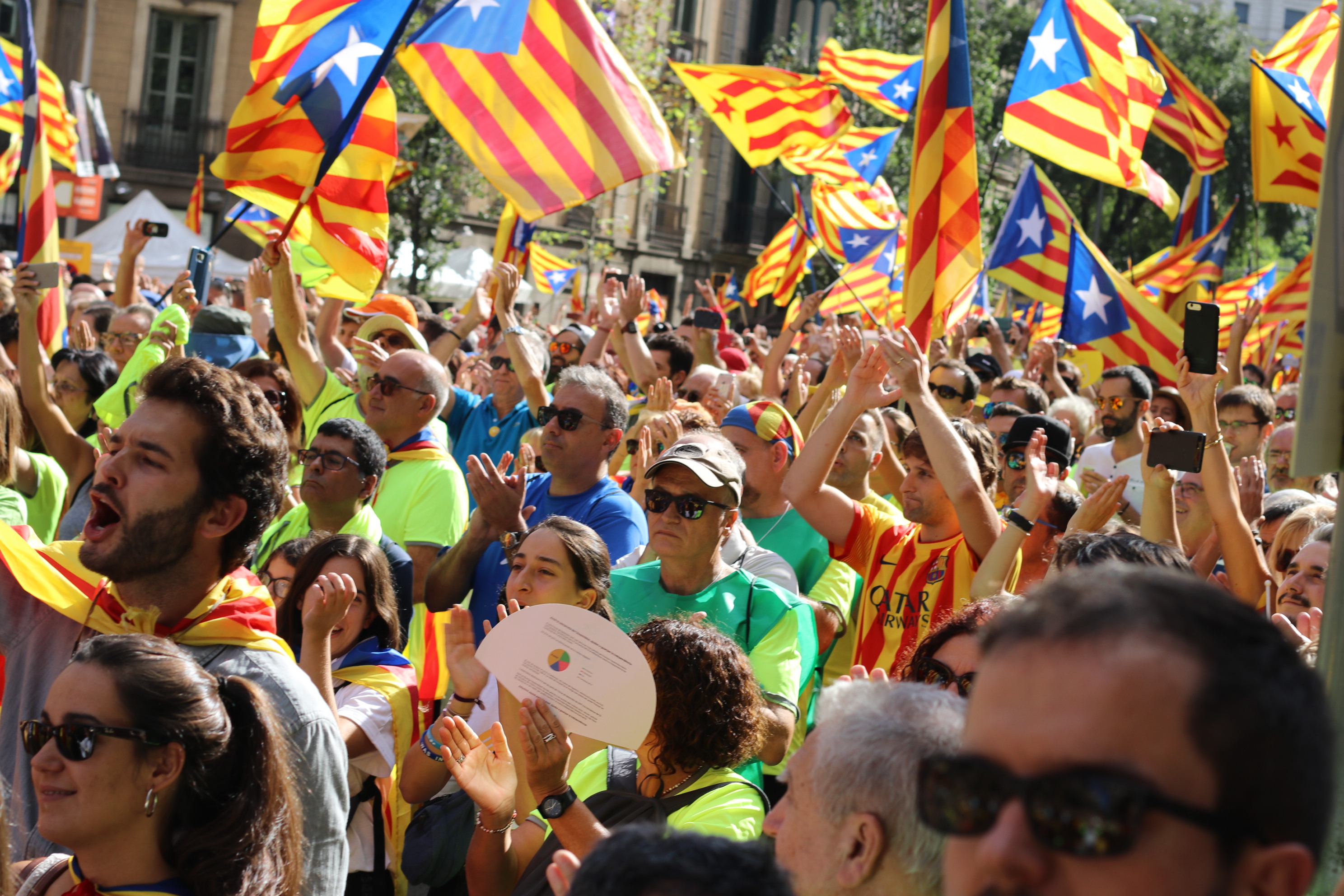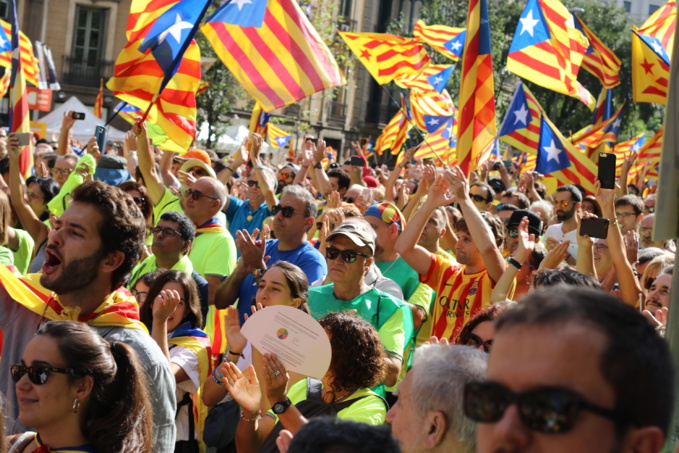The direct rule of Madrid in Catalonia, proclaimed late last year after a serious confrontation between the central authorities and Catalan separatists, was accompanied by arrests and clashes with the police, as well as the dismissal of the government led by Carles Puigdemont. Now it came to an end. The rule lasted 199 days and ended on Monday evening, when the Catalan parliament elected a small regional president with a small majority. 55-year-old Quim Torra won with a margin of just one vote: 66 deputies voted for his candidacy, 65 votes against. The fact that he became president only at the second attempt speaks of a stubborn struggle. The first round of elections took place on Saturday, but brought no result.
Incidentally, the elections were attended by Carles Puigdemont and other Catalonian politicians, who left abroad last year, hiding from the persecution of the Spanish authorities. Since October 2017, Puigdemont first lived in exile in Brussels, after which he moved to Berlin, where he now awaits a decision of the German court at the request of Madrid for his extradition. The former president of Catalonia is accused of inciting sedition and embezzling public money.
The new head of Catalonia considers Carles Puigdemont the true President. Puigdemont himself was re-elected in absentia as President in December 2017, but Madrid stated that the elections were void and canceled their results.
Anti-capitalist party "Popular Unity Candidacy" (CUP) helped Quim Torra win. Four of its representatives abstained from voting. The other party colleagues voted against Torra, whom they call the "neoliberal capitalist" and who, in their opinion, is not vigorous enough in advocating "disobedience" to Madrid and "confrontation" with the central government.
CUP clearly overdid it with such a characteristic. It is not a secret that new President of Catalonia dislikes all Spanish. He, however, publicly apologized for his tweets, in which he called the Spaniards "shameless and capable only of exploiting other nations." At the same time, Torra said that he does not understand how someone in Catalonia may want to speak Spanish. Here, Torra himself went too far, because fathers or mothers, or even both parents, of more than 60% of the Catalans are of Spanish origin. According to polls of the Government of Catalonia approximately 43% of Catalans consider themselves native Spanish.
Despite the apology, Quim Torra declared in his election program that he was in favor of Catalonia's independence, albeit through dialogue with Madrid. He is promising to tirelessly work on the actual creation of the Catalan Republic, which was proclaimed in October last year after the referendum on independence. The government of Mariano Rajoy recognized the referendum illegal and said it violated the constitution of the kingdom through the court.
Not surprisingly, Eva Granados, spokeswoman for the Socialist Party, called the new leader of Catalonia "a supremacist (supporter of the superiority of one group over all others) and an ultranationalist" who hates half of the region's population whom he has to lead.
Be that as it may, on Monday Catalonia received a new president and formally began to return to normal life. However, all observers agree that with the latest election of Quim Torra, the possibility of achieving at least a fragile agreement between Barcelona and Madrid did not come close to a single step.
The official Madrid’s reaction to the election of Quim Torra is predictably negative. Prime Minister Rajoy has already hinted that he could again resort to Article 155 of the Spanish Constitution, which allows the central government to establish direct central administration of regions, if Torra tries to continue the course of proclaiming independence from Spain. The likelihood of this is very high, because the new President of Catalonia has already hinted that the crisis in Spain, connected with the separation of the richest and most populous region, has not ended.
"Article 155 ceased to be an article of the constitution," Mariano Rajoy said last Friday, on the eve of the elections in Barcelona. "Now it has become a precedent and a procedure that can be resorted to if necessary. I hope that such a need will not arise... "
source: thespainreport.com
Incidentally, the elections were attended by Carles Puigdemont and other Catalonian politicians, who left abroad last year, hiding from the persecution of the Spanish authorities. Since October 2017, Puigdemont first lived in exile in Brussels, after which he moved to Berlin, where he now awaits a decision of the German court at the request of Madrid for his extradition. The former president of Catalonia is accused of inciting sedition and embezzling public money.
The new head of Catalonia considers Carles Puigdemont the true President. Puigdemont himself was re-elected in absentia as President in December 2017, but Madrid stated that the elections were void and canceled their results.
Anti-capitalist party "Popular Unity Candidacy" (CUP) helped Quim Torra win. Four of its representatives abstained from voting. The other party colleagues voted against Torra, whom they call the "neoliberal capitalist" and who, in their opinion, is not vigorous enough in advocating "disobedience" to Madrid and "confrontation" with the central government.
CUP clearly overdid it with such a characteristic. It is not a secret that new President of Catalonia dislikes all Spanish. He, however, publicly apologized for his tweets, in which he called the Spaniards "shameless and capable only of exploiting other nations." At the same time, Torra said that he does not understand how someone in Catalonia may want to speak Spanish. Here, Torra himself went too far, because fathers or mothers, or even both parents, of more than 60% of the Catalans are of Spanish origin. According to polls of the Government of Catalonia approximately 43% of Catalans consider themselves native Spanish.
Despite the apology, Quim Torra declared in his election program that he was in favor of Catalonia's independence, albeit through dialogue with Madrid. He is promising to tirelessly work on the actual creation of the Catalan Republic, which was proclaimed in October last year after the referendum on independence. The government of Mariano Rajoy recognized the referendum illegal and said it violated the constitution of the kingdom through the court.
Not surprisingly, Eva Granados, spokeswoman for the Socialist Party, called the new leader of Catalonia "a supremacist (supporter of the superiority of one group over all others) and an ultranationalist" who hates half of the region's population whom he has to lead.
Be that as it may, on Monday Catalonia received a new president and formally began to return to normal life. However, all observers agree that with the latest election of Quim Torra, the possibility of achieving at least a fragile agreement between Barcelona and Madrid did not come close to a single step.
The official Madrid’s reaction to the election of Quim Torra is predictably negative. Prime Minister Rajoy has already hinted that he could again resort to Article 155 of the Spanish Constitution, which allows the central government to establish direct central administration of regions, if Torra tries to continue the course of proclaiming independence from Spain. The likelihood of this is very high, because the new President of Catalonia has already hinted that the crisis in Spain, connected with the separation of the richest and most populous region, has not ended.
"Article 155 ceased to be an article of the constitution," Mariano Rajoy said last Friday, on the eve of the elections in Barcelona. "Now it has become a precedent and a procedure that can be resorted to if necessary. I hope that such a need will not arise... "
source: thespainreport.com



















